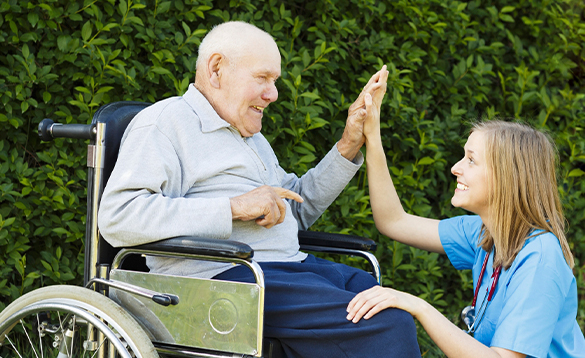Introduction;
There is no denying the value of consistent physical activity when it comes to one’s health and fitness, and this is not pertaining to any age in particular. In fact, to put it vaguely, it is among the healthiest things you can do for your body. Finding a suitable exercise plan that fits an elderly person's lifestyle and any potential constraints might be difficult, but isn’t impossible. Seniors can still establish a program at any age to start reaping the many advantages of regular physical activity.
You don't need to be fully mobile to reap the rewards of exercise for your health. There are many methods to use exercise to improve your mood, combat depression, relieve stress and anxiety, boost your self-esteem, and broaden your view on life, even if an illness, accident, handicap, or weight issues have restricted your mobility.
Uncertain about where to begin? Follow the steps & exercises mentioned below in this article;
- Begin slowly & improve over time
- Be coherent: work with consistency
- Warm up properly in the start & essentially cool down
- Keep yourself properly hydrated
- Begin Slowly & Improve Over Time;
It can be tempting to resume a workout that you used to be able to finish with easy at any age. It might be exhilarating to try new workouts, but too much excitement could result in an accident or over-exertion. Consult a doctor, physical therapist, or other health care provider before beginning your new fitness program. They might be able to provide you with exercises that you can perform at home with the help of a caregiver. In order to be consistent, you must give your body time to acclimatize to movement.
- Be Coherent: Work With Consistency;
It's crucial to maintain consistency while also starting out slowly with physical activity. Setting a specific and practical plan for your workout goals may fall under this category. Including movement in your daily routine will help you develop a habit of exercising and make it a regular part of your life. According to research studies, developing a fitness program can be greatly aided by making exercise a habit.
- Warm Up Properly In The Start & Essentially Cool Down;
When introducing a new practice gradually, warm-ups and cool-downs might be particularly crucial. Warm-ups can help you avoid injuries and lessen muscle soreness, while cool-downs allow your heart rate and blood pressure to gradually return to normal. Similar movements, such as stretching, gentle exercise, and brief durations, may be a part of these activities. Giving your body enough time to get ready for exercise and recover afterward can be crucial in lowering your risk of injury.
- Keep Yourself Properly Hydrated;
It is anticipated but simple to forget to stay hydrated before, during, and after exercise. Dehydration can increase the difficulty of your workout and perhaps lead to more dehydration. To prevent the harmful effects of dehydration, setting reminders to drink water can be useful.
Observe & Assess: Listen To What Your Body Tells You;
Once you've decided to live an active lifestyle, it's important to pay attention to your body. Finding some days easier than others or losing motivation are both totally typical occurrences. When you are feeling fatigued, take some time to rest and remember that getting enough sleep is just as vital as exercising.
Always consult your doctor and other medical experts; they may be able to advise you on the activities that will benefit your body the most. Involving your caregiver could be beneficial and make you feel less overwhelmed by all the new things you are learning. In order to keep you on track to accomplish your goals, your caregiver might even be able to assist you with your regular exercise routine.
Staying secure while working out is crucial! If you feel pain, discomfort, nausea, lightheadedness, dizziness, lightheadedness, chest pain, an irregular heartbeat, shortness of breath, or cold hands, stop exercising. Limit your workouts to 5 or 10 minutes and instead work out more frequently if you consistently feel pain after 15 minutes of activity, for instance.
Workouts to Consider & Pursue;
It can be intimidating as well as exhilarating, especially at this age, to consider trying new exercises. Although consulting a specialist is always recommended, it could also be helpful to have some prior knowledge on exercises that you might find interesting.
Here are a few exercises that could be useful for elderly people with limited mobility;
Range Of Motion;
How far you can move or stretch a particular physical part, like a joint or a muscle, is referred to as range of motion. Loss of muscle with advancing age might lead to a reduction in range of motion. You can practice side stretches, seated abdominal presses, semi-sits, and other exercises to expand your range of motion.
Chair Workouts & Yoga;
Sitting down allows you to perform a variety of activities. Some of which can be more concerned with core and upper body strength. Leg lifts while seated can be a terrific exercise for flexibility and strength while engaging your core, if you are able. Yoga positions can be performed in a chair in a variety of ways that are low-impact on the joints and enhance balance, flexibility, and other qualities.
Exercises in the Water;
Physical activity among older persons can raise the risk of falling. Water exercises can reduce this danger because the water supports the body, but you should still be aware of your surroundings and any potential hazards. Water aerobics is an excellent exercise for increasing stability and reducing joint pain.
Walking;
An excellent method to start a workout regimen. Despite the fact that it could seem like a no-brainer, it's crucial to consider the benefits of walking. Even a decrease in walking pace has been linked in certain studies to cognitive loss.
Conclusion;
Mobility issues create an increasing number of challenges for family members who are looking for things to do when visiting or caring for an aging loved one. The above mentioned pattern of exercise and the convenient work out techniques mentioned in the article will certainly help you improve health and fitness of your loved ones. Generally speaking, exercise is imperative for the development of the mind and body and for maintaining a healthy lifestyle, especially when you have limited mobility issues. A healthy balance between work, rest, and activities is vital. Therefore, be conscientious in working out on a daily basis.

